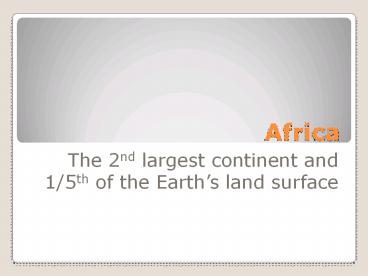Africa PowerPoint PPT Presentation
Title: Africa
1
Africa
- The 2nd largest continent and 1/5th of the
Earths land surface
2
Geography
- Less than 5 is rainforests-mostly along the
equator - Largest climate zonethe savanna - grassy plains
that have good soil and irregular rainfall. - Major deserts
- Sahara-worlds largest
- the Kalahari
- the Namib
3
- Along the Mediterranean coast and the southern
most tip is fertile farmland - Major Rivers
- Nile
- Niger
- Zambezi
- Resources salt gold iron copper oil and
diamonds - blood diamonds
4
Early Africa
- Sahara spread due to desertification (dry land
region becomes increasingly arid, typically
losing its bodies of water as well as vegetation
and wildlife) - Bantu Migrations-West African farmers and herders
that migrated to the South-speak Bantu - Camels from Asia-huge role in trade
5
- Arab armies brought Islamcities like Cairo, Fez,
and Marrakesh thrived on the Muslim community - Early Civilizations
- Egypt
- Carthage-fell to Rome during the Punic Wars
- Nubia/Kush (Land of the Bow)
- Nubian capital-Meroe
- Extremely wealthy in natural resources gold and
iron ore - Worshiped Apedemak (god of war)
- Fell to Assyrian armies
- http//africa.mrdonn.org/kush.html
6
Kingdoms of West Africa
- Gold and salt dominated the Saharan trade
- Ghana was considered land of the gold due to
their wealth made from selling gold - Capital Kumbi Saleh
- Absorbed Muslim traditions
- Almoravids pious Muslims of North Africa who
launched a campaign to spread their form of Islam
and eventually swallowed control of Ghana to set
up the Kingdom of Mali - Led by the Lion Prince
7
Mali- page 426-427
- Mankas, or kings, expanded influence over gold
and salt trade - Greatest Emperor Mansa Musa of Mali
- Expanded borders westward and northward
- 25 year reign
- Wanted to ensure peace in his empire
- Completed the Hajj-pilgrimage to Mecca
- Forged diplomatic and economic ties with other
cities - Helped Timbuktu become the city of learning
8
Forest Kingdom of Benin
- In the rainforest of Guinea
- Farming villages who traded pepper, ivory, and
slaves - Kings were called Oba-they ruled both politically
and religiously - A 3 mile long wall surrounded the city
- http//africa.mrdonn.org/benin.html
9
Trade Routes
- Kingdom of Axum profited greatly from their
strategic location of its 2 main cities Adulis
on the Red Sea and Axum on the upland - Axum commanded a triangular trade network that
connected Africa to India - They traded everything from ivory and gold to
wine and olives
10
What Else did Trade bring?
- Christianity
- Axums great king, Ezana, converted to
Christianity - Christianity strengthened ties between Africa and
the Mediterranean world - Islam was simultaneously spreading and cultural
ties in Africa were created - Although Axum slowly declined politically-its
cultural legacy thrived in Ethiopia which also
maintained ties to the Holy land
11
A Blend of Cultures
- International trade created a rich blend of
cultures in Africa - Africans, Asians, Middle Easterners, Indians and
even Europeans
12
Great Zimbabwe
- Great Stone buildings
- Very important trading location silk, glass,
beads, carpet, pottery, minerals, ivory, coconut
oil - Inhabited by the Bantu-speaking peoples
- They perfected building methods
- At its largest, reached from the Zambezi River to
the Indian Ocean. - Decline around 1500 is believed to be a result of
over farming and exhausted soil.
13
- https//www.youtube.com/watch?vjvnU0v6hcUo
14
Peoples and Traditions
- The Ways of African societies varied greatly from
place to place - Hunters and Gatherers were around and many
traveled from one African land to the other - They lived in small bands of 20-30 and could
track animals over long distances
15
Existence
- Herders also existed in Africa
- Because grazing was limited these societies were
often nomadic - Along coastlines and rivers fish were the basic
food - Fish could be traded to inland towns for grain,
animal skins, and other products
16
Concept of Community
- Farming communities raised a variety of crops
grains, yams, bananas - Farmers practiced slash-and-burn agriculture
this is clearing forest and brush land with iron
axes and hoes, and then burning the remains to
use for fertilizer
17
Government
- Power was given to a single chief or important
decisions were made by the elders of the tribe - The Kingdom of Kongo had an organized government
- They used the power of a king and also selected
chiefs to rule each individual village
18
Family
- Families were very important to African society
- Nuclear Famil were typical with parents and
children working together as a unit
19
Kinship
- Patrilineal important kinship ties and
inheritance were passed through the fathers side - Matrilineal inheritance traced through the
mothers side - Lineage group of households who claimed a
common ancestor
20
Religion
- Many African peoples believed that a single,
unknowable supreme being stood above all the
other gods and goddesses - They also believed in many gods though

